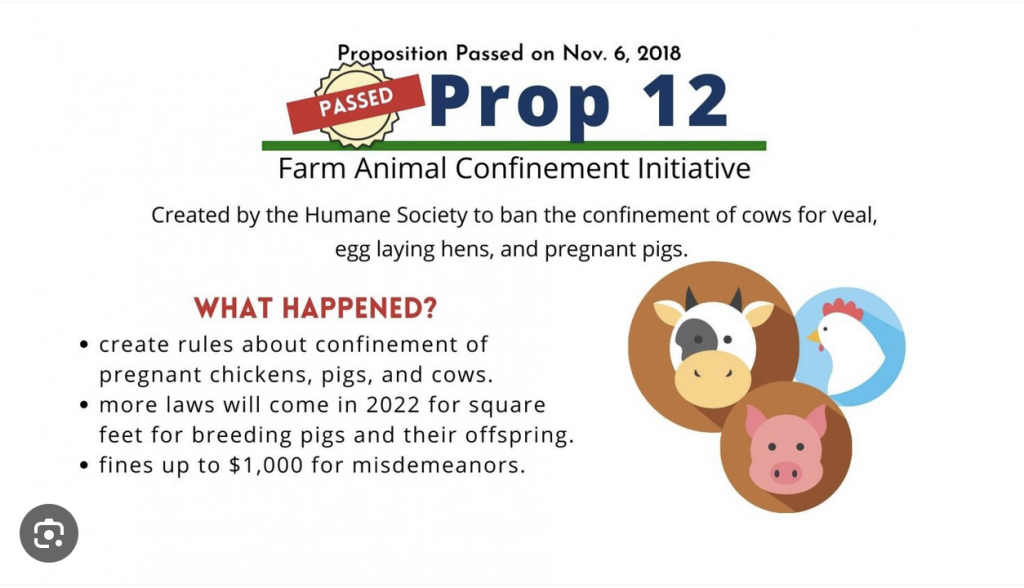
For years, animal rights extremist organizations have pushed for state-level legislation banning frequently-used animal care practices, such as gestation stalls for pregnant sows or cages for laying hens.
The Animal Agriculture Alliance said the true motive of these changes is to make it less efficient and more expensive for farmers to raise animals for food, driving up the cost of meat, dairy, poultry, and eggs for consumers. This activism forces consumers to make tough choices about what they can afford to feed their families and forces farmers to make costly changes that may make it impossible to keep their businesses afloat.
Hannah Thompson-Weeman, president and CEO of the Alliance, helped bring Proposition 12 status up to date in California because of rulings and postponements. Many people have many questions. July 1 was the first deadline, and it appears January 1, 2024, will be the date for selling Prop 12-compliant pork products in California.
The original Prop 12 regulations remain the same, only reality-check admissions and making things work with meat already in the supply chain and freezers but not Prop 12 compliant.
Thompson-Weeman said while the California Department of Food and Agriculture held a series of webinars, a California judge ruled that moved the final implementation and enforcement of Proposition 12 from July 1 to January 1 of 2024 for meat already in the supply chain by July 1. “So make no mistake, that is not a delay in Prop 12 but a transition period for any animals that processors had before July 1 and in the supply chain and products in cold storage,” she said.
It means no waste of existing products, but producers need to comply with the rigid Prop 12 regulations moving forward.
It takes Prop 12 certified auditing firms who can certify that the product is Prop 12 compliant. Thompson-Weeman said that after July 1, if producers believe they are Prop 12 compliant, they can self-certify and sell to California.
“But they’re going to need to get that certification from an approved auditor before the end of the year to stay compliant.”
She said it’s a transition period where processors who believe their product is compliant or can self-certify that. But then, by the end of the year, they will have to have one of these audit firms provide that additional level of certification to sell pork in California.
“That’s why there’s a bit of uncertainty about how much Prop 12 compliant product is even available on the market because, with the decision coming so late, minimal move toward third-party certification, to be in place by the end of the year.”
The confusion about animal activists’ activity and what to watch continues in California.
Thompson-Weeman said the other extensive conversation is Massachusetts, where they passed a similar piece of legislation 2016 called Massachusetts Question Three, set to go into effect in 2022. They agreed to hold off on enforcement until at least 30 days after the Supreme Court ruled in the Prop 12 lawsuit. There has yet to be a lot from the Massachusetts Attorney General about the enforcement of Question Three. It even takes the Prop 12 standards a step further, saying that whole pork can only be transshipped through the state if it is Question Three, compliant. With many questions and transitioning in California, there’s a paused pending court case.
“Once they pick that back up, we could see the final judgment and have about 30 days after that final judgment for that law to come into effect.”
On the positive, some legislators have reintroduced the Eats Act or The Ending Agricultural Trade Suppression Act, introduced by a coalition of lawmakers from states with a large amount of animal ag production, unlike California and Massachusetts. Legislators from Kansas and Iowa have come together to introduce legislation that would go through Congress in Washington, DC, which would restrict states like California from being able to pass this type of legislation.
“They’re making very similar arguments to what was made in the Supreme Court case saying that California voters should not have the power and authority to pass legislation that impacts farmers and ranchers in other states.”
Voters in other states affected by Prop 12 didn’t have an opportunity to be part of the process, so the proposed legislation brought out a flurry of animal rights activist groups in opposition using a lot of the same talking points, said the president and CEO of the Animal Ag Alliance. •
— By Harry Siemens





